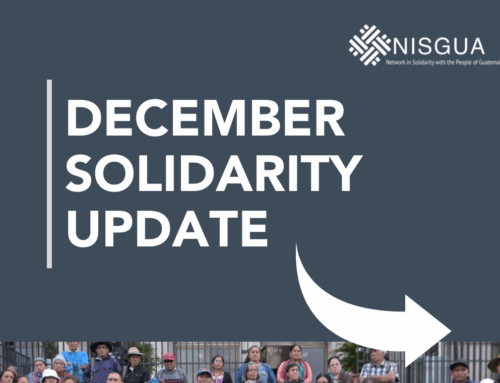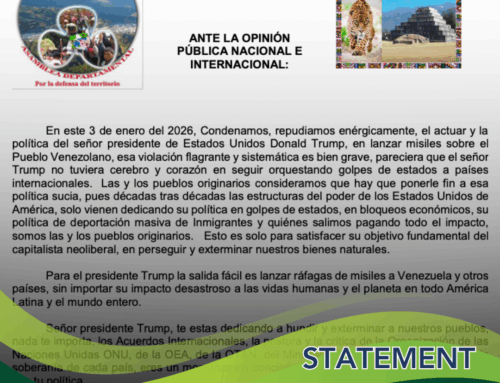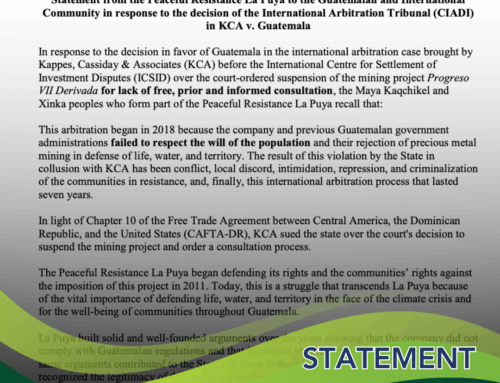|
Solidarity Update: May 4, 2016
|
|
Justice & Accountability
- CREOMPAZ: Public Prosecutor presents evidence in the largest case of forced disappearance in Guatemala’s history
- Closed-door genocide retrial moves to Ixil territory
- Newly-released military documents shed new light on the Diario Militar
Defense of Life & Territory
- Observer mission travels to Huehuetenango to document human rights violations in the context of hydroelectric projects
- “Communities Rise Up” delegation builds connections across borders
News from the Grassroots
- Commemorating the life of Bishop Gerardi
- Now accepting accompanier applications for 2017
- This spring, connect movements for gender justice!
|
|
|
Former military officials indicted on charges of forced disappearance and crimes against humanity hear the charges against them in the CREOMPAZ case. Photo: Nelton Rivera, Prensa Comunitaria
|
|
|
CREOMPAZ: Public Prosecutor presents evidence in the largest case of forced disappearance in Guatemala’s history
Earlier this year, major arrests were made in connection to crimes against humanity committed by the Guatemalan military between 1981 and 1988. After more than 500 bodies were uncovered during exhumations at the CREOMPAZ military base in Cobán, Alta Verapaz, 11 former military officials were indicted on charges for the role they played in ordering and carrying out the disappearance and killing of civilians in the region. Yesterday, the Public Prosecutor’s office and plaintiff organizations began to present evidence with the hope that the case will be sent to trial.
Similarly, plaintiffs in the case of the 1981 forced disappearance of 14-year-old Marco Antonio Molina Theissen were set to present evidence on April 19 against former military officials, but Judge Judith Secaida unexpectedly suspended the trial proceedings to await the resolution of an appeal made by the defense for amnesty. This now-familiar stall tactic has been used by many former military officials on trial despite the fact that amnesty laws are not applicable in cases of crimes against humanity.
In a recent speech, Marco Antonio’s sister, Lucrecia, said “These struggles aren’t made up of heroes and justice isn’t achieved through miracles. It is achieved by human action, taken by ordinary people.” She talked about the long search for her brother and called on the national and international community to support this case and the search for thousands of others who have been disappeared in Guatemala. Follow NISGUA_Guate on Twitter and read our blog for live coverage of these cases.
|
|
Closed-door genocide retrial moves to Ixil territory
The tribunal hearing the closed-door retrial of former dictator Efraín Ríos Montt and his head of military intelligence was suspended this morning to await a firm resolution on whether the two men should be tried together. Both are charged with genocide and crimes against humanity, but when Ríos Montt was declared mentally unfit to stand trial in 2015, the court ordered the retrial to proceed in his absence. He has since been represented by lawyers in a hearing closed to the press and national and international observation. Plaintiffs argue that Rodríguez Sánchez should be tried separately to protect his right to due process and the rights of survivors to a public trial. There is no set date for a firm resolution.
For several weeks, eye-witnesses and experts have been ratifying the testimonies they gave during the 2013 trial that convicted Montt of genocide. While they firmly uphold the validity of the sentence that was later overturned by the Constitutional Court, plaintiff organizations continue to participate in retrial proceedings as a way to exhaust all legal possibilities for justice in Guatemala.
Unexpectedly, the tribunal moved to Ixil territory for three days last month to hear testimonies from elderly witnesses and those too sick to travel to Guatemala City. Despite initial concerns for the safety of survivors, the Association for Justice and Reconciliation (AJR) and the Center for Human Rights Legal Action (CALDH) acknowledged the historic and symbolic moment in moving the trial to the region where genocide was committed. Translations of the daily reports from CALDH of trial proceedings can be found on NISGUA’s blog.
|
|
Newly-released military documents shed new light on the Diario Militar
In a March 31 hearing for the Diario Militar case, Judge Miguel Ángel Gálvez entered into evidence eight plans that detail military strategy and operations between 1983 and 1990. The Diario Militar is a chilling 53-page list that names 183 people forcibly disappeared by Guatemalan security forces between 1983 and 1985. The list, broadly known as the “Death Dossier,” was leaked to Kate Doyle in 1999, senior analyst and director of the Guatemala Documentation Project at the National Security Archives. Only a handful of the remains of people listed in the diary have been found.
Judge Gálvez’s review of the documents comes after years of persistent denial of their existence on the party of the military. According to Aura Elena Farfán of the Families of the Detained-Disappeared in Guatemala (FAMDEGUA), “[These documents show] that the Army was capable of developing plans to destroy the population just because they saw them as an internal enemy. I hope that the release helps advance not only the Diario Militar case, but all of the cases for violations that occurred during the internal armed conflict in Guatemala.”
|
|
|
A clandestine grave is exhumed at the CREOMPAZ military center. Visit CPR-Urbana for in-depth photo essays from other exhumations that have taken place to date. Photo: CPR-Urbana
|
|
|
DEFENSE OF LIFE & TERRITORY
|
|
Observer mission travels to Huehuetenango to document human rights violations in the context of hydroelectric projects
From April 6 to 9, NISGUA participated in the “Caravan for Dignity,” an observer mission made up of national and international grassroots, indigenous, campesino, and accompaniment organizations. The caravan traveled to northern Huehuetenango to meet with communities resisting the expansion of hydroelectric projects imposed without community consent, starting in Santa Eulalia where communities have been affected by the criminalization and unjust imprisonment of their ancestral leaders. After traveling to Santa Cruz Barillas to express solidarity with the third anniversary of the peaceful resistance to the hydroelectric project imposed by Hidro Santa Cruz, the caravan traveled to Ixquisis, San Mateo Ixtatán.
There, communities recounted human rights violations occurring in the context of the imposition of hydroelectric projects owned by Proyecto de Desarrollo Hidrico, PDH, S.A. NISGUA continues to provide accompaniment to political prisoners from Huehuetenango who have been criminalized in their struggle to protect land and water, and will be reporting more of the conclusions from the observer mission as they arise.
|
|
“Communities Rise Up” delegation builds connections across borders
When Llan Carlos Dávila of the Diocesan Committee in the Defense of Nature toured the U.S. last fall as part of NISGUA’s annual speaking tour, he invited audiences to come and see for themselves the destructive impact Tahoe Resources has brought to southeastern Guatemala. He also encouraged participants to learn from the creative and resilient ways communities in the area have resisted the company’s Escobal silver mine and help build cross-border strategies to stop its expansion.
In response, NISGUA organized an eight-day delegation to the area in March, bringing activists, organizers, students, and members of faith communities from the U.S. and Canada to exchange stories, build advocacy skills, and make plans for bringing grassroots messages of non-violent resistance to the international community. Visit our blog for an in-depth report back from the delegation.
|
|
Commemorating the life of Bishop Gerardi
On April 24, hundreds gathered in Oakland’s Fruitvale neighborhood to commemorate the lives and work of Bishop Juan José Gerardi Condera and Óscar Arnulfo Romero and Galdámez, Catholic clergymen assassinated for their respective roles in movements for justice in Guatemala and El Salvador. This year’s annual celebration was held at Parroquía Santa Isabel, opening with a photo exhibit and a short march in which participants carried crosses bearing the names of individuals disappeared by the military during Guatemala’s internal armed conflict. Others held up copies of the Gerardi-backed truth report “Guatemala: Never Again,” affirming ongoing struggles for truth and justice nearly 20 years after the conflict’s end. Monseñor Álvaro Leonel Ramazzini Imeri, bishop of the Diocese of Huehuetenango, officiated a mass in remembrance of the two men and addressed the community in a closing reception in which he spoke of the importance of faith and solidarity for communities impacted by ongoing violence and divided by borders and migration.
|
|
Now accepting accompanier applications for 2017
Committed to social justice and cross-border solidarity? Become a human rights accompanier with NISGUA! Accompaniers provide an international presence alongside Guatemalans organizing in defense of their rights, including precedent-setting genocide trials and local opposition to mega-projects.
We are now accepting early applications for a 2017 training, to be held January 7-13 in Berkeley, CA. Applications are accepted on a rolling basis until October 15, 2016. Visit our website for more information on accompaniment and details on how to apply.
|
|
This spring, connect movements for gender justice!
Earlier this year, we witnessed a major victory in the fight for gender justice in Guatemala when, for the first time in the Americas, a national court successfully tried sexual slavery as a crime against humanity for acts committed on its soil. Now is an important moment to make sure that international attention doesn’t fade in light of the verdict. We invite you to stand with us in continued solidarity with the women survivors as they confront post-trial risks for speaking out.
During the month of May, take part in our annual house party campaign and make connections between struggles for gender justice in Guatemala and your feminist work at home. Connect with other grassroots movements for change in the United States, while inviting guests to make a tangible financial contribution to help us continue our work accompanying human rights defenders in Guatemala. Participate in a nationally-coordinated solidarity action by taking a picture saying, “I stand with the women of Sepur Zarco because…” Visit our blog for more information on hosting a house party and message ideas!
|
|
|
|












Leave A Comment